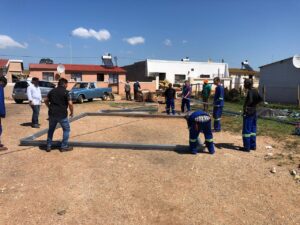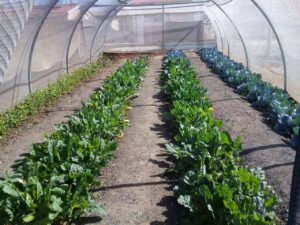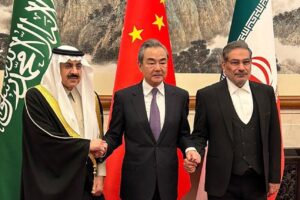
By Janet Cherry
The Southern African region has borders, but nature does not acknowledge these borders. All human societies in the region are dependent on what nature provides. The food-energy-water nexus in the region exists within the global political economy, within a global system of production and within a global food system. This global system has, over the past two hundred years, resulted in climate change, which is having, and is going to have, a particularly harsh impact on this region. The countries of the region share one coastline, and access to two oceans which cannot be owned by any country.
Much of the contested narrative around the just transition is framed in terms of localisation, national development imperatives, and regional (Southern African Development Community, SADC), continental (African) or anti- imperialist/developing countries (BRICS) agendas. In this piece I want to go back to the question of scale, including the notions of the community, the society and the nation; and link the debate on the just transition to sub-regional economies, including industrialisation, labour markets and commodity exports. An eco-socialist alternative to populist, nationalist and Africanist narratives is put forward. A tentative argument is made for some kind of transitional socialism between the ‘commune of communes’ in a truly localised eco-socialist solution, and a social-democratic society within a regional development context of Southern Africa.
- Resource exploitation and the rise of new oligarchies in Southern Africa
On 14 April 2022, I heard South African president Cyril Ramaphosa on the SAFM radio talking about the devastation of the floods on the coast of KwaZulu-Natal and Eastern Cape:
“This disaster is part of climate change. It is telling us that climate change is serious. It is here. We can no longer postpone the measures we need to take to deal with climate change” (Burke, 2022).
The way in which resources, whether on land or marine, are used, and how they are used within region and global economies, is critical to the future of all who live in this region. What is exploited, and how it is exploited; what is produced, and how it is produced, and for what markets: these are the questions to be answered. Oil, tobacco, prawns for export out of the region; or hydro-electricity, beans and crab for regional and local markets – these are the kind of choices that have to be made. The path dependency of economies trapped in commodity exports and dependent on food, technology and manufactured imports and foreign aid can be overcome by using the natural resources of the region for industrial development employing non-fossil fuel energy.
While many elites in the region are anticipating that oil and gas development will be a ‘game changer’, it is by no means certain that exploitation of offshore resources will benefit the majority of the population. Joseph Hanlon (2021) makes a convincing analysis that the Mozambique elites are a new oligarchy, benefitting from the sale of minerals to overseas elites, as have the Angolan and Zimbabwean elites. A development path based on dependency on commodity exports, and on fishing and farming using unsustainable methods, is not the answer to the challenges of the region. There are alternatives, which can be supported and tested and shared across the region, to enable an answer to the challenges of food and energy security and climate shocks. These alternatives involve an inclusive, integrated and sustainable system of production in the sub-region; a localised system of food production and distribution based on principles of food sovereignty; a labour market based on solidarity among all workers in the sub-region and the protection of the rights of all workers, whatever their country of origin.

2. Which transition? Between ‘green’ capitalism and a transitional eco-socialist economy
Ruth First, working as an activist scholar in Mozambique forty years ago, held this understanding at the centre of her work. As her friend (comrade, colleague) Bridget O’Laughlin wrote, “she thought and worked with (and drummed into us) the concept of a Southern Africa as regional ‘system’ historically forged by a distinctive form of capitalist production grounded in migrant labour, concentration of capital in South Africa and racialised political dualism. She knew that most South Africans and Mozambicans did not think about the region in this way, but part of her mission was to explain why an enduring revolutionary project depended on their doing so” (2014, 30).
This piece takes as a starting point the sub-regional context, as well as the global context of climate change. By the sub-region I refer in particular to South Africa, Mozambique, Malawi, Botswana, Zimbabwe and Namibia. The assumption is that there is an overriding imperative to respond to the challenge of climate change. This response is determined both by the position of these countries in the rapidly decarbonising global economy, and by the need for resilience to the climate shocks which the sub-region is already experiencing.
Within this context, the focus is maintained on the poorest residents of the poorest countries in the region. How can they participate in the transition from fossil fuel? What is the potential for them to benefit from this transition, rather than be victims of it? Mozambique and Malawi are among the poorest countries in the world, measuring in terms of GDP per capita; Zimbabwe is not faring much better, despite the enormous wealth generated from the sale of gold and diamonds over the past decade. This is illustrated by the GDP per capita of ‘Least Developed Countries’ by United Nations categorization of 2021 (GDP Per Capita PPP) : while the average was $ 3335, Mozambique was at $ 1347, Malawi at $1638, and Zimbabwe $ 2323. South Africa with a GDP per capita of $ 14624 remains as the regional hegemon, the only economy with a strong industrial base, an agricultural sector producing a surplus for export, and an economy that despite chronic unemployment and drastic inequality, is large enough to absorb millions of economic migrants from Malawi, Zimbabwe and Mozambique. It is argued here that a dual strategy is needed: an integrated approach to the transition which builds on mineral resources for development of new ‘green’ industries, and simultaneously the building of decentralised, democratised, resilient and sustainable agriculture, food, water and energy systems.
Many of the strategies of activists in the Just Transition are focused on localisation, by which is meant ‘community’ level: taking control over food production and distribution, water capture, energy production for access and use, sustainable and energy efficient building methods, permaculture based production systems, and so on. While these are all necessary pilots of the kind of ecosocialist future we desire, prefigurative exercises in building the future in the present, they are situated within a global capitalist economy; in our country this economy excludes many millions of people. Justice Malala wrote that “here is the cold, hard truth: they (8 million unemployed youth in SA) will opt out of the current social, economic and political arrangements and they will choose anarchy” (2015, 115).
John Endres of the South African Institute of Race Relations (SAIRR) thinks the action of the private sector and civil society in taking over the roles of the state as the state fails is a positive thing:
“South Africa’s greatest opportunity for the future is to be found: in its innovative and resilient private sector and civil society, which are solving problems in the growing absence of the state, and doing so successfully. In years to come, South Africa may well become a case study of how private initiative succeeds where states fail. And in future, South Africa could end up with an enabling, compact state – or a ‘lean state’ which cooperates with non-state actors instead of trying to stifle their efforts” (2023).
Thabo Mbeki (cited in Endres 2023), on the other hand, considers this action to be ‘counter revolutionary’. Does it provide some space for initiatives, in between a social-democratic state and the ‘commune of communes’ where the state has withered away? Can the progressive majority take control of part of the means of production through food and energy cooperatives, acting still within the national and regional economies, to build a more distributive and inclusive economy? Could this potentially pave the way for a transitional eco-socialist solidarity economy? For such a society to work, the economy would have to be inclusive not only of the 10 million unemployed, but also of the zamazamas (informal miners extracting gold from disused mines), the subsistence farmers, and the landless, homeless and displaced from across the region.

3. The green transition as a lever for structural transformation
The potential does exist for decentralised energy production and distribution though renewables, given the natural advantage that Southern Africa has in regard to sunlight, as well as significant wind and water resources. This, in turn, is related to ‘green industrialisation’, the use of carbon- free energy to industrialise. While there is a strong argument for a complete halt to new fossil fuel exploitation, there is an important distinction to be made between hard commodities (minerals) and energy commodities (coal, oil and gas). There is significant potential for ‘green industrialisation’ using the minerals found in the region; the use of green minerals to develop RE industry and value chains, for example lithium-ion batteries (LIBs), green hydrogen and EVs (trains, trams) for public transport. A ‘green steel’ industry is also potentially viable as part of an integrated and sustainable industrial development policy (Trollip et al. 2022).
Decentralised energy through PV solar can also provide many advantages in development programmes in both urban and rural contexts, from mini-grids to provide electricity to remote villages and stimulate their economy; embedded generation and grid-feed-in to provide sustainable electricity for national development. Linkages with government policies for low-cost housing, urban development, sustainable villages, internet access, health and education; social development policies in particular cash transfers to rural areas to stimulate production for local markets; strong local economic development policies and support for rural agricultural hubs, providing access to technology, finance, banking and capital. Affordable clean energy for low- income households through PV solar is one of the obvious ‘quick wins’. In the most transformative versions, the patterns of ownership and resource distribution in society may be irrevocably altered by renewable energy: the kind of structural transformation in production relations that Ruth First was aiming for.
Agriculture policy in the region also has to be linked to climate change, both to climate threats and to the urgent need for transformation of food systems. Modern agriculture is heavily fossil- fuel dependent, and the systems of food storage and distribution are likewise. Woods et al. argue that technology, renewable energy and changes in management “will all play important roles in increasing the energy efficiency of agriculture and reducing its reliance on fossil resources”’ (2022, 2991). The dominant policy focus on development of industrial agriculture and exploitation of other ‘soft commodities’ for export is inappropriate for climate resilience and food sovereignty in the region, and for preservation of global biodiversity and long-term food security.
Industrial ocean fishing is particularly problematic, with regional restrictions on commercial fishing being necessary but difficult to enforce. Commercial agriculture which is carbon intensive requires policies which restrict industrial animal production and the use of fossil-fuel based fertilizers; and other aspects of the sub-regional food system, such as sugar cane, are also problematic. Policies which advocate their replacement with low-carbon and drought resilient alternatives suitable to the sub-region; diverse and nutritious, drought resistance crops are being supported by international NGOs and tested in some countries in the sub-region, but with little traction to date. Given that large parts of the sub-region are still dependent on subsistence or household farming, which are most vulnerable to climate shocks, rather than move to capital-intensive, carbon-intensive industrial agriculture, it may be possible to transform small-scale farming and build sustainable local economies through the use of renewable energy and other appropriate technologies.
Lastly, transport and the automotive industry stand to be completely transformed. While the transition to EVs is currently focused on the export of luxury motor cars, the alternative is for production of vehicles and transport systems for affordable and sustainable public transport. Our factories are being repurposed for EVs: why not repurpose at the same time for making green hydrogen trucks and buses, solar powered electric trams and trains, using green steel and minerals from the region, for public transport? An imaginative and regionally integrated industrial policy is required to make this work.
4. Not quite eco-socialism but a pathway forward
Together, these approaches to regional industrialisation can provide an approach to the just transition which is both local (in the sense of community local rather than ‘national local’) and regional (in the sense of sub-Saharan Africa region) rather than national or provincial. In the context of global capitalism, it is not quite the delinking that Samir Amin (1990) proposed, nor is it eco-socialism, but rather advocates some way towards sub-regional breaking of historic patterns of dependence, and the use of existing resources to build a different kind of economy which serves the needs of people rather than profit.
The content of HKWM-Blog publications is the responsibility of its authors and of InkriT e.V. and does not necessarily reflect the position of the Rosa Luxemburg Foundation.
Janet Cherry is a South African activist and academic. She is currently Professor of Development Studies at the Nelson Mandela University in Gqeberha. Her main areas of research are sustainable development, political economy of development, democratic participation and social and political history. She is lead researcher in the Transition Township project, exploring community owned renewable energy, circular economy and food sovereignty in South Africa’s townships.
Prof Cherry’s Masters and PhD research students are from many African countries including Zimbabwe, Malawi, Rwanda and Ethiopia. They have conducted research on a range of related topics, including conservation agriculture, land tenure and food sovereignty, women’s empowerment through cooperatives, and the just transition from fossil fuels. Her current research project is entitled “Emancipatory scholarship: meeting the challenge of climate change in Southern Africa through piloting alternative development strategies for the region”. This research relates to the political economy of energy and water in Southern Africa, sustainable agriculture and food sovereignty, regional markets and labour migration.
Bibliography
S. Amin, Delinking: Towards a Polycentric World, London and New Jersey 1990.
J. Burke, “After the relentless rain, South Africa sounds the alarm on climate crisis”, in: UNDRR Prevention Web, April 24th, 2022. Accessed at https://www.preventionweb.net/news/after-relentless-rain-south-africa-sounds-alarm-climate-crisis, 8 February 2024.
J. Endres, “When the state drives a nation’s ruin, private actors must step in and help stop the rot”, in: Daily Maverick, October 19th, 2023. Accessed at https://www.dailymaverick.co.za/opinionista/2023-10-19-when-the-state-drives-a-nations-ruin-private-actors-must-step-in-and-help-stop-the-rot/, 8 Febuary 2024.
J. Hanlon, “Turning Mozambique into a mafia, resource-curse state”, in: Round Table 110, Issue 3 (2021), 405-406, available at: https://doi.org/10.1080/00358533.2021.1932949.
J. Malala, We have now begun our descent: how to stop South Africa losing its way, www, 2015.
B. O’Laughlin, “Why was Ruth First in Mozambique?”, in: Deportate, Esuli e Profughe [Deported Exiles and Refugees] 26 (2014), 25-41.
H. Trollip, B. McCall and C. Bataille, “How green primary iron production in South Africa could help global decarbonization”, in: Climate Policy, 22/2 (2022), 236-247.
J. Woods, W. Williams, J. K. Hughes, M. Black and R. Murphy, “Energy and the food system”, in: Philosophical Transactions of the Royal Society B, No. 365, Issue 1554 (2010), 2991-3006, available at: http://doi.org/10.1098/rstb.2010.0172.



